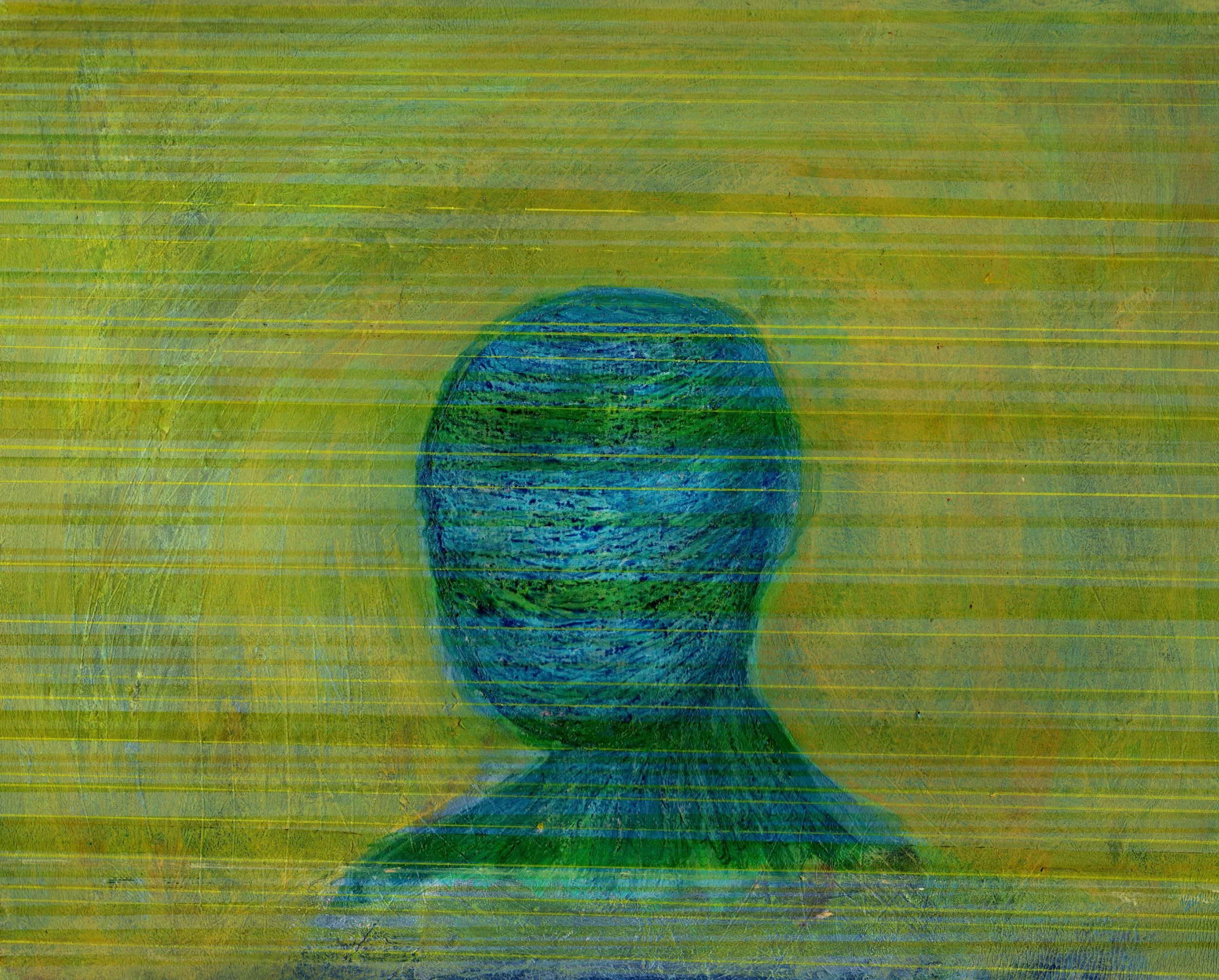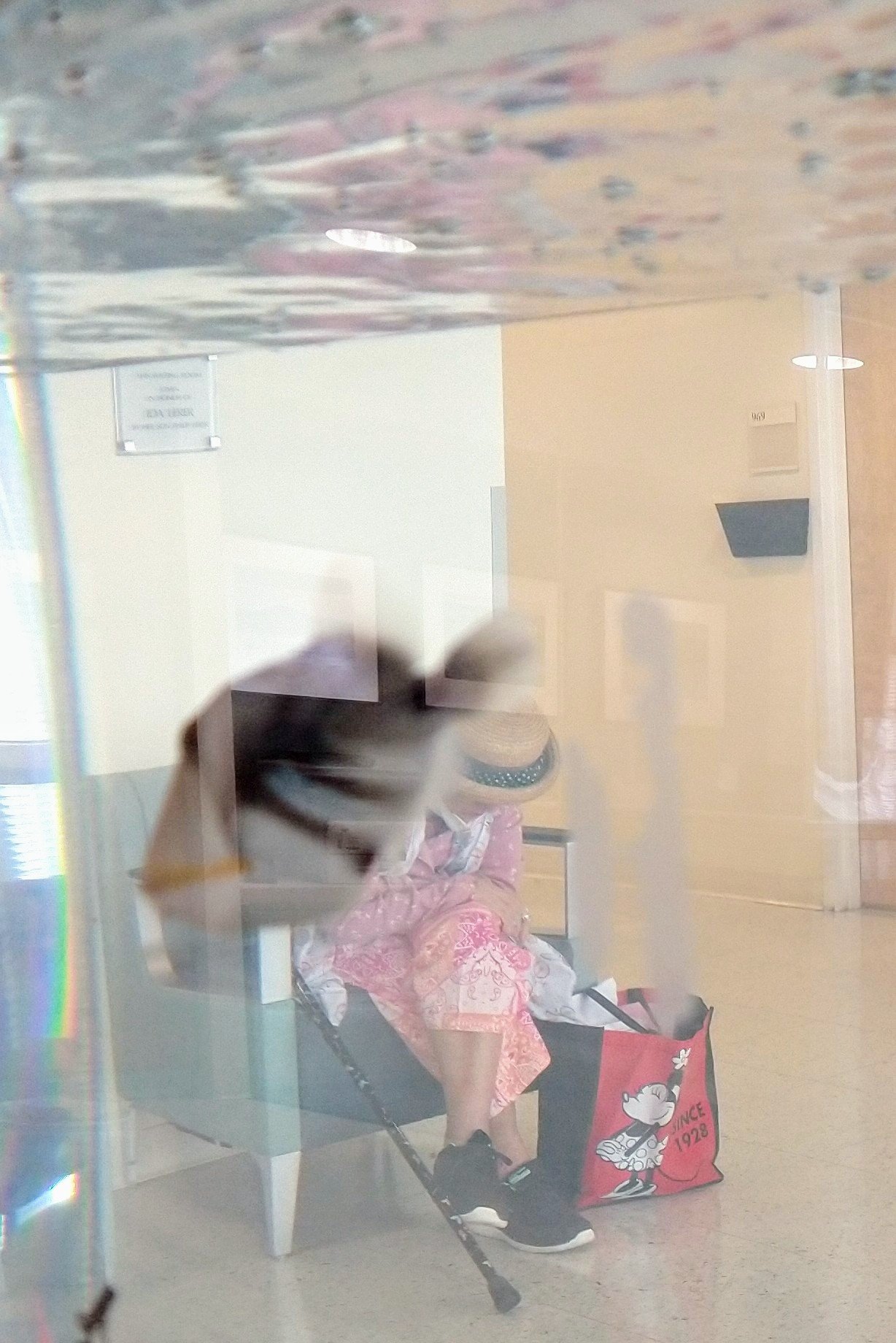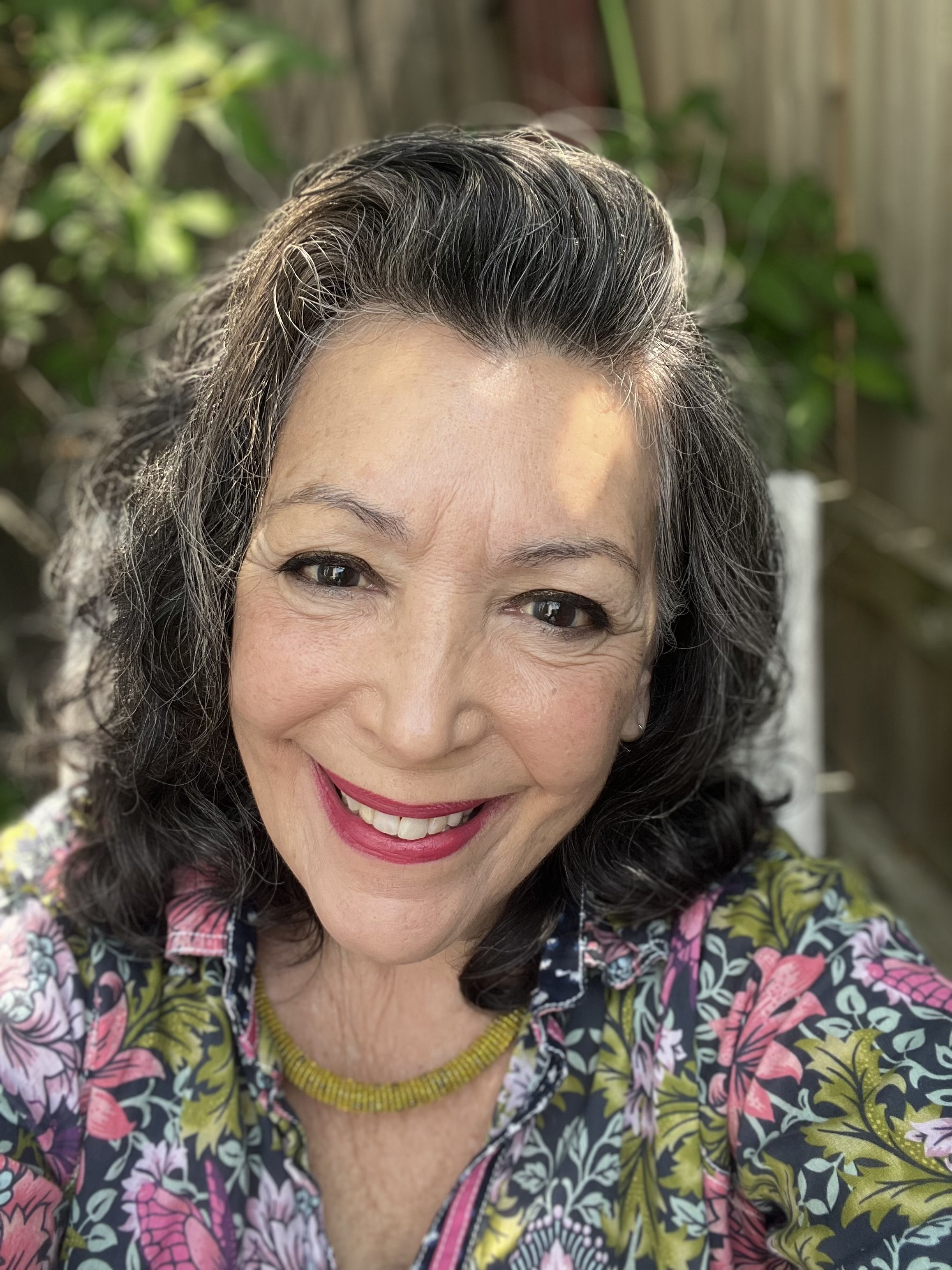Maja Milkowska-Shibata, creator of “Beyond Broken: The Science of Bone Lengthening
and My Ilizarov Story” in the Fall 2024 issue of Intima expresses her appreciation for fellow graphic artist, Gianna Paniagua, whose comic, “Human Experience,” appeared in the Fall 2022 issue.
Dementia and Alzheimer’s Disease: When the Outside Looks Different From What’s Happening Inside by Kimberly Mitchell
© The War Outside. From “The Impact of War on Mental Health” series. Claire Lawrence Spring 2022 Intima
One of my most enduring memories of volunteering is of helping with a beauty club for patients with advanced Alzheimer’s Disease. Each week I would be regaled with stories of young women visiting their mothers and planning fun outings with their girlfriends. While I applied makeup and painted fingernails, the smiles and facial expressions were those of young women anticipating a good time.
On the outside these ladies were quite different.
Endurance and Gratitude: A reflection on finding joy in difficult moments by Laura Carmen Arena
Both Karen George’s poem, and my “Triptych:Oncology Fish,” share an expression of admiration for the resplendent inner strength in our loved ones, emanating despite the foreboding shadows of illness, suffering and loss. The emotions floating around our lived spaces as our loved ones endure and battle disease in the face of difficult circumstances move in many directions including grieving, reflecting, hoping, enduring and celebrating, colors that shift and radiate with the heroically hopeful, illuminating presence of gratitude and love.
Read moreWhat Clown Doctors See and Don't See: A Look at Healthy Humor by Phyllis Capello
Phyllis Capello, who is a writer and musician, is a NYFA fellow in fiction I and a winner of an Allen Ginsberg Poetry Award. Her collection “Packs Small Plays Big” is from Bordighera Press, 2018. Cantastoria work (sing/storyteller) has taken her from Ireland-to-Istanbul. She has presented at the International Oral History Conference in Rome, Italy and has been a musician/clown since 1990 with Healthy Humor Red Nose Docs, as well as a member of the poetry/activist trio, The Ferlinghetti Girls. ferlinghettigirls.com In 2023 she was honored with People’s Hall of Fame Award for teaching artistry for her work in New York City schools. Her poem “The Ballad of a Harlem Boy” appears in the Fall 2023 Intima: A Journal of Narrative Medicine.
For thirty years, my hospital work (I’m a clown ‘doctor’/musician for Healthy Humor) has included meeting and entertaining families in clinic waiting rooms, Pediatric ICUs, triaged Emergency Departments and in out-patient, in-patient rooms. Clown-doctor encounters can, if invited, also extend to physical therapy and treatment rooms, hallways, nurses’ stations and elevators. In ED and in out-patient and in-patient rooms permission comes from the medical and childlife staff first (and pertains to situational or isolation status). After that, the child’s permission (being our ultimate “boss”) to enter is strictly respected. In a hospital environment, we are one thing a child can prevent from entering their room.
Knowing when to present ourselves and when to exit means we are not often present for the trauma of Emergency Medical procedures unless specifically requested by staff. I do not see the immediate medical aftermath of a bullet wound. The hands of professionals as they seek to save a life as in Kirilee West’s drawing of hands entitled: “6:21 P.M.” That is why the piece really speaks to me of the drama and humanity inherent in the moments before a medical clown can be of any use to a patient.
Her drawing resonates with me as my poem, “The Ballad of a Harlem Boy,” was written after a nurse shared her distress about a child’s death. Telling us (we work in pairs) of her direct experience, I could only think of her hands and their expert ministrations during that terrible time and of the depth of her humanity for the mortally-wounded fourteen-year-old and his mother.
We all want our hands to be of use: I, in my small way, making music or writing poems; medical staff whose hands take on the most difficult and tender of roles; the artist’s hands who can capture with a charcoal stick the enormity of what we might see if, after the fact, we can allow our creativity to take a step back and tell a story.
Phyllis Capello, who is a writer and musician, is a NYFA fellow in fiction I and a winner of an Allen Ginsberg Poetry Award. Her collection “Packs Small Plays Big” is from Bordighera Press, 2018. Cantastoria work (sing/storyteller) has taken her from Ireland-to-Istanbul. She has presented at the International Oral History Conference in Rome, Italy and has been a musician/clown since 1990 with Healthy Humor Red Nose Docs, as well as a member of the poetry/activist trio, The Ferlinghetti Girls. In 2023 she was honored with People’s Hall of Fame Award for teaching artistry for her work in New York City schools. Her poem “The Ballad of a Harlem Boy” appeared in the Fall 2023 Intima: A Journal of Narrative Medicine.
A Transplant Patient's Reflection on Living While Dying
An artist and organ transplant recipient considers the isolation of her own illness experience and further explores these issues in her graphic medicine comic, published in this very journal.
Read moreHow Patients Teach Us by Catalina Flores
A nurse contemplates how and why patients are made to feel like burdens—simply for having several needs.
Read moreThe Lost Patient Narrative in our era of "EHR-Centered" Medicine: A Reflection by family medicine physicianJacqueline Redmer
A family medicine physician reflects on the true costs for the patient and the clinician of the increasing digitization of modern medicine.
Read moreWhere do you turn for comfort? A reflection on Popsicles, Tater Tots and hospital gift shops by internist Ben Goldenberg
“Sometimes the job we do isn’t about fixing what’s wrong but rather helping each other survive within the confines of our brokenness.” Artwork: The Art of Being Here by Kirilee West Spring 2022 Intima
Read moreOn Imagined Boundaries: A reflection on "the body as a narrative instrument" by Tony Errichetti
A medical educator reflects on studio art recently published in the Intima and examines the boundaries—real or imagined?—often constructed between mind and body.
Read moreThe Chance to Say Goodbye... or Not: Thoughts about being prepared—or surprised— by death by end-of-life doula Virginia Chang
An end-of-life doula reflects on their experiences with dying patients and concludes by offering three life lessons.
Read morePoems Help Us Deal with Change and Choice by Anne Corey
A writer advocates for the power of poetry—as well as its curious ability to make us better accept uncertainty, mystery, and even ourselves.
Read moreThe Sincerity of A Great Story: A Reflection on “A Life” by Judith Hannah Weiss
A writer analyzes a piece of fiction published in this journal—and comes to discover the power contained within each line of writing.
Read moreA Sound Mind in a Sound Body, a reflection by poet Anastasia Vassos
© Pillar of Light by Jacqueline Pflaum-Carlson. Spring 2022 Intima
A writer and poet finds inspiration in the body’s architecture and corporeal underpinnings.
Read moreWho Knows How the Body Turns? A Reflection on Lyme and Rheumatoid Arthritis by Sheila Luna
A writer living with rheumatoid arthritis finds companionship in another writer living with Lyme disease. Although these two diseases may be different, they continue to manifest in similar ways.
Read morePoets on Poets: A Look Back and Forward by Ellen Goldsmith
A poet reflects on what companion poets and their poetry can offer us in the face of unexpected illness and loss.
Read moreRooms and Wombs and Writing: A Reflection on Stories Highlighting Life’s Impermanence by Patrick Connolly
I’ve come back to Hemingway’s “Hills Like White Elephants” so many times. He uses third person objective point of view to create a chill in a scene that could otherwise be exuberant and exotic. A train station, central Spain, a hot afternoon, people talking about their lives together, an unspoken baby on the way – and that is a problem.
Read moreInside Voices: Learning When to Listen, When to Control by writer Marleen Pasch
In my short story “Rocks and River,” ( Fall 2021 Intima) a young woman named Tran Huong Giang stands on the MacMillan University Bridge and looks into the ravine below. She knows—as does writer Meredith O’Brien in her essay “Another Game Day”(Fall 2021 Intima)—what it’s like to hear two voices.
Read moreWhen Medical Professionals Care for Their Own: A Response to “Of Prematurity and Parental Leave,” by Mason Vierra
“Of Prematurity and Parental Leave” (Intima, Fall 2021) describes the harrowing experience of giving birth to a premature baby during residency. It’s written by doctors married to each other —Dr. Campagnaro and Dr. Woodside—who co-construct a narrative by telling it from their own perspective.
Read moreWhen the “Clock of the Living” Runs Down: A Reflection by clinical social worker and chaplain Betty Morningstar
The fractured stories at the end of life often reflect an ineffable but powerful experience of creativity, insight or even revelation. These opportunities arise because the dying person doesn’t see time according to the clock of the living. Imagine how much one could conceive of were time not of the essence.
Read moreLife in the Gaps: How Illness Transforms Our Sense of Time by Renata Louwers
It was in those gaps, between our lived experience—the crushing uncertainty about how long my husband would live, the daily reality of his intolerable pain, and the abrupt shift from a life of joyful ease to one spent contemplating death—and the oncology profession’s standards of care, first-line treatments, and numeric pain scales that my frustration festered.
Read more



